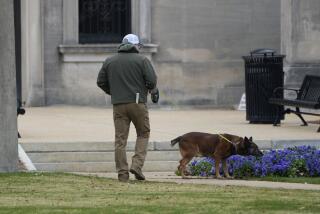If Terror Comes, You’re on Your Own
The latest elevated terrorist alert in Washington, New York City and parts of New Jersey serves as a stark reminder of a deep, dark secret that the federal government and local law enforcement would just as soon keep from you: In the next terrorist attack in the United States, you are basically on your own.
Although the Department of Homeland Security and local law enforcement are doing everything in their power to prevent such an attack, the reality is that something somewhere is going to happen, and when it does, you as a private citizen better have a plan to help yourself and your family. Because when such an attack occurs, the forces of human nature and panic will immediately take over, and government contingency plans and communications strategies will be right out the window.
Although officials are rightfully doing all they can to protect obvious government and financial targets, the experts I talk with tell me that they think the terrorists will still try to hit soft targets. Something like the D.C. or New York City subways or buses, or both.
Realistic security for those systems is all but nonexistent. On the day that Homeland Security Secretary Tom Ridge raised the alert, Metro police could be seen in Washington’s subway cars, the officers dressed in commando gear and carrying machine guns, while passengers were happily sipping the coffee and eating the food they had smuggled onto the trains. Instead of food, the items just as easily could have been weapons. In the New York City subway system, which has been at “Code Orange” since 9/11, two passengers were recently shot, one at 2 p.m., and both gunmen escaped.
The point I’m making is that our nation is too big and too open and has too many targets of opportunity for any agency to fully protect us from all-but- invisible cowards.
Are the warnings from the Homeland Security Department part of some crass political campaign to help reelect President Bush? I do not for a second believe that. Is there some “cover your butt” activity going on within the administration? To some extent, of course. As there is with the Kerry campaign. John Kerry will not criticize or question these warnings out of a totally rational concern. If the worst happens, he doesn’t want to be remembered as saying that the warning was political.
With this in mind, there are two issues that are crucial to our survival and peace of mind. The first involves us as individuals. What can we do to improve our chances if disaster strikes and the government, through no fault of its own, fails us?
There are simple, oft-suggested steps, but I am willing to bet that -- with the exception of those in earthquake country -- most Americans have not prepared because it has become a cliche. You need to have a week’s supply of water and food, batteries, a radio, flashlights, candles, cash and other survival gear at home. If you work in an office in a city, you need to have several days’ supply of water and food, with some of it near your desk.
You and your family also need to agree upon a meeting place should the unthinkable happen. Land-line phones and cellphones will be out or overloaded, so you need to determine that the family will meet at a certain time and place.
With regard to the larger federal role, there is only one answer. We need to bring the leaders of the Muslim faith from around the world to the table and make them part of the solution. Islam is a great religion that is being twisted by a minute, fanatical minority, and the leaders of Islam have to acknowledge that and work with the rest of the world to find a way to stop those fanatics. If this doesn’t happen, then anything else we do to stem radical terrorism will be in vain.
It is going to be an unpredictable and somewhat dangerous world for a number of years. We need to acknowledge that fact, demand the most from our leaders and watch our own backs.
*
Douglas MacKinnon, former press secretary to Bob Dole, worked in the Pentagon from 1990 to 1993.
More to Read
Sign up for Essential California
The most important California stories and recommendations in your inbox every morning.
You may occasionally receive promotional content from the Los Angeles Times.










